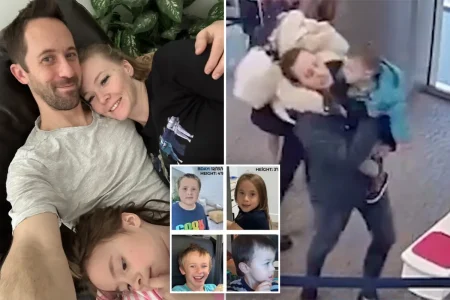The Tragedy of Iryna Zarutska: A Ukrainian Refugee’s Life Cut Short
A devastating tragedy has struck Charlotte, North Carolina, leaving a community in mourning and raising serious questions about public safety and criminal justice reform. On August 22, Iryna Zarutska, a 23-year-old Ukrainian refugee who had fled her war-torn homeland just two years prior, was brutally stabbed to death while riding a light rail train. Surveillance footage captured the horrific moment when Decarlos Brown Jr., a 35-year-old homeless man with an extensive criminal history including 14 previous arrests, allegedly attacked the unsuspecting young woman from behind as she sat looking at her phone. The chilling video shows Brown unfolding a pocket knife before approaching Zarutska, who remained completely unaware of the danger behind her. After the attack, Brown can be seen wandering through the train with blood spattering across the floor, removing his bloodied hoodie, and calmly exiting when the train reached its next stop. Perhaps most disturbing was the apparent indifference of other passengers, who seemed not to notice or respond to the violent assault that had just occurred.
The aftermath of this senseless killing has sparked intense debate about media coverage, public safety, and criminal justice policies. Charlotte’s Democratic Mayor Vi Lyles thanked media outlets that chose not to share the graphic footage “out of respect for Iryna’s family,” a statement that drew sharp criticism from several Republican representatives. Congressman Brad Knott called the mayor’s response “despicable” for failing to directly condemn the violence, while Representative Mark Harris characterized the incident as “a microcosm of a national epidemic” resulting from what he described as “Democrats’ soft-on-crime policies.” The political discourse surrounding the murder reflects deeper divisions about how communities should balance compassion with accountability in their approach to criminal justice. Meanwhile, local politicians like city council candidate Edwin B. Peacock have used the tragedy to highlight ongoing safety concerns on Charlotte’s public transportation system, questioning whether fare evasion might be connected to criminal activity and calling for greater security measures to protect commuters.
Iryna Zarutska’s story is particularly heartbreaking considering her journey to America. Having escaped the Russian invasion of Ukraine in 2022, she had come to the United States seeking safety and opportunity, only to meet a violent end while commuting home from her job at Zepeddie’s Pizza. The restaurant paid tribute to her on Instagram, describing her as “not only an incredible employee but a true friend” who brought “warmth, kindness, and light” into their lives every day. They mentioned keeping a candle burning in her memory, a poignant symbol of the bright life extinguished too soon. The cruel irony that someone who fled war would die violently in what should have been a place of refuge has added an extra dimension of tragedy to her death, resonating deeply with many Americans across the political spectrum who see in her story both the promise and the failings of their country.
The alleged perpetrator’s background has become a central point in discussions about criminal justice reform. Court records reveal that Decarlos Brown Jr. had accumulated more than a dozen convictions dating back to 2014, including a five-year sentence for armed robbery. Released in September 2020, he was arrested again just five months later for allegedly assaulting his sister, yet somehow remained free on the streets despite this lengthy criminal history. This pattern has fueled criticism of what some characterize as lenient policies that prioritize rehabilitation and reduced incarceration over public safety. Critics argue that better monitoring of repeat offenders might have prevented this tragedy, while advocates for criminal justice reform might counter that systemic failures in mental health care, homelessness services, and reintegration programs are the root issues that need addressing. The case exemplifies the complex challenges facing communities as they grapple with balancing second chances with public safety concerns.
The media response to the killing has itself become controversial, with some commentators, including former DOGE secretary Elon Musk, criticizing what they perceive as insufficient coverage by mainstream news outlets. The racial dynamics of the case—a Black man accused of killing a white woman—have unfortunately attracted attention from far-right groups, threatening to overshadow the human tragedy with political agendas. However, many community members have focused instead on honoring Zarutska’s memory and addressing practical safety concerns on public transportation. Local leaders in Charlotte and surrounding communities like Matthews have called for renewed attention to security on the light rail system. Former Matthews Mayor Jim Taylor expressed disappointment in “the loss of focus on making the light rail welcoming & safe to travelers,” suggesting that conditions would “only get worse” until authorities addressed “the root cause” of safety issues.
Iryna Zarutska’s death represents not just an individual tragedy but a convergence of several troubling social issues: the vulnerability of immigrants and refugees, the challenges of addressing recidivism and homelessness, the security of public transportation, and the increasingly polarized discourse around crime and punishment in America. As Charlotte mourns this bright young woman who survived war only to die on a commuter train, the community faces difficult questions about how to move forward. Was this an isolated incident or a symptom of broader systemic failures? How can cities ensure that public spaces remain safe for everyone? What interventions might have prevented this tragedy, and what changes might prevent similar ones in the future? Beyond the political rhetoric and media coverage, there remains a fundamental human story—a young woman who sought safety and opportunity in America, whose coworkers kept a candle burning in her memory, and whose life deserves to be remembered for more than the terrible way it ended. In honoring Iryna Zarutska, perhaps Charlotte and communities across America can find the wisdom and compassion to address the complex issues her death has illuminated.










